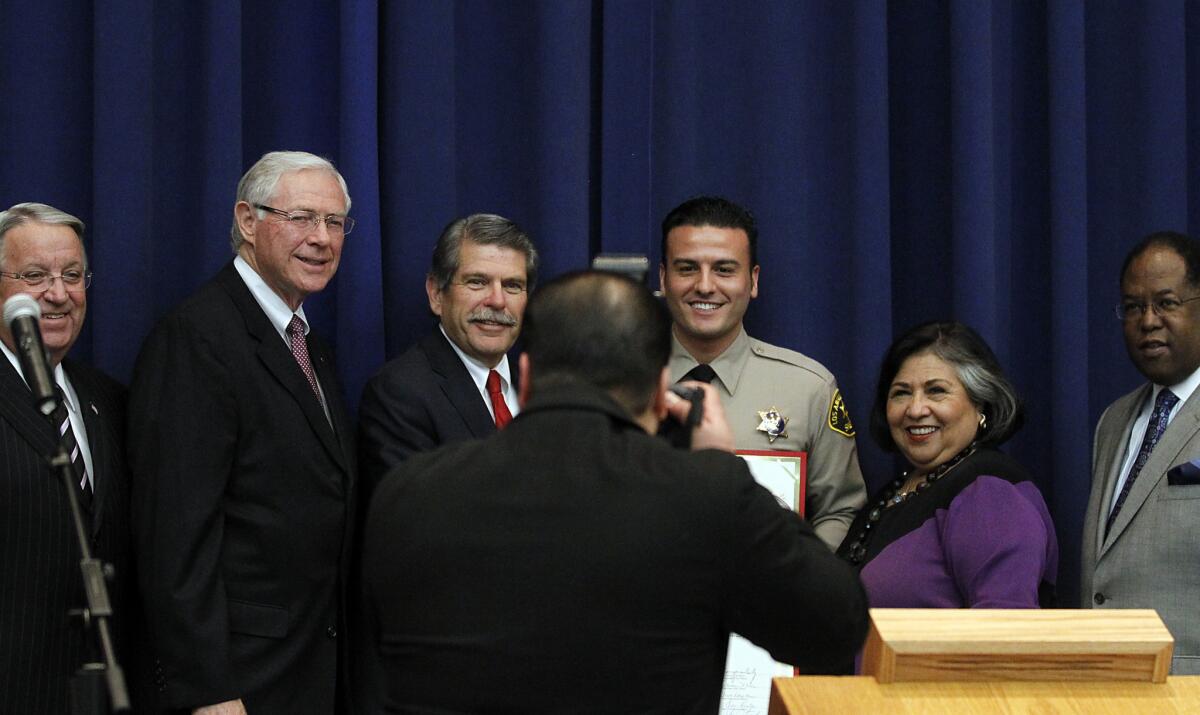L.A. County supervisors violated open-meeting law, D.A. finds

- Share via
Los Angeles County supervisors violated the state’s open-meeting law earlier this year by discussing compensation negotiations behind closed doors without properly informing the public, according to the district attorney’s office.
The D.A. investigation followed a July meeting where Supervisor Gloria Molina said she thought it was inappropriate that the board had discussed in closed session an increase of taxpayer contributions to a top art official’s compensation package.
Deputy Dist. Atty. Bjorn Dodd concluded it was not improper for the board to discuss the matter in closed session, but that the supervisors violated the state’s open-meeting law, known as the Ralph M. Brown Act, by failing to include those discussions on the public agenda before the meeting.
Eric Preven, a county resident who often scrutinizes board business and unsuccessfully ran for supervisor, filed a complaint with the district attorney’s public integrity division after hearing Molina’s comments this summer. He said he was pleased with the recent finding.
“This goes to accountability,” he said.
Failing to put the item on the agenda robs the public of the chance to bring up the issue with the board before they meet in closed session for discussion, said Terry Francke, general counsel for the open-government group Californians Aware.
Last week, Dodd wrote to county supervisors informing them of his finding. He told them he expected his letter would prompt them to be more careful when preparing agendas and said he didn’t plan to take any further action on the issue.
County counsel Mark Saladino said he agreed with the D.A.’s finding, adding that the county had included the discussions on the agendas for several closed session meetings but had done so incorrectly. They were listed as department head performance evaluations, he said, instead of as a labor negotiation.
“If that’s the way they want it on the agenda, then sorry, we goofed,” he said. “We’ll get it on correctly in the future.’“
The closed session discussions were about the county’s contributions to a compensation package for Laura Zucker, the Los Angeles County Arts Commission’s executive director.
The recent violation by the board adds to the county’s checkered history of complying with the Brown Act.
In 2002, the county inadvertently released documents to The Times revealing that the board had held closed-door meetings to discuss killing a ballot measure. A couple of years later, then-Dist. Atty. Steve Cooley concluded that supervisors broke the law by deciding in secret to close a local trauma center. (A Superior Court judge ultimately disagreed with Cooley.) Several open-government experts criticized supervisors again in 2007 for selecting a headhunting firm in private.
Under state law, it is a misdemeanor crime to violate the Brown Act if a government official “intends to deprive the public of information to which the member knows or has reason to know the public is entitled.”
Despite the county’s controversial record, Dodd said the district attorney’s office can’t take further action unless prosecutors see a pattern of similar violations.
“At this point there’s nothing else we can do,” he said, adding that “in the grand scheme of things, this isn’t really a big one.”
Supervisors Don Knabe and Mark Ridley-Thomas didn’t respond to calls for comment, and spokesmen for Mike Antonovich, Zev Yaroslavsky and Molina declined to comment.
For news from the Los Angeles County criminal courts, follow @marisagerber
More to Read
Sign up for Essential California
The most important California stories and recommendations in your inbox every morning.
You may occasionally receive promotional content from the Los Angeles Times.











